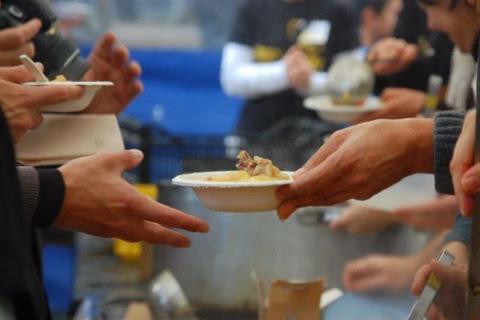Now we have to shape what some have started calling; The Church at Home. Although I keep asking myself; What do those who do not have a home do? For this reason, at the same time, I am declaring today in our Holyrood Church a Lenten day of prayer, fasting and reading the Bible in the Time of the Coronavirus.
Salvific Liberation

Good morning, happy Thursday, and many blessings.
In the gospel of Marcos 14: 12a. 22-25 we learn about the institution of the Eucharist. When we come together to celebrate and receive the Eucharist, we must remember that it is more than a banquet, more than a sacrifice and more than a memorial in the usual sense of the word. In the Eucharist we meet Jesus personally.
The practice of the eucharist is also justice and liberation. However, the practice of the Eucharist has become so ritualized and privatized that it has lost much of its meaning — meaning which an examination of its original practice can help us recover. To confront death is to witness to and collaborate with the love that raised Jesus Christ from the dead.
The Last Supper was a real meal, not ritualized worship. There was the smell of roast lamb and herbs, the clatter of dishes, the splashing of wine poured into a cup, and table talk -- whispering, laughter and questioning. There were scraps of bread and meat left in the dish -- the debris of a meal. The eucharistic "breaking of bread" in the context of a real meal where the most basic human needs are met was taken for granted in the early church.
The Eucharist is a sharing community’s meal. From the beginning, celebrating the Eucharist involved sharing goods and possessions. Yet the unity of breaking the bread and sharing the goods is a continuing strand of thought and practice throughout the church’s first four centuries.
St. John Chrysostom tells us to feed the hungry, and then decorate the table. The temple of our afflicted neighbor’s body, he admonished, "is more holy than the altar of stone on which you celebrate the holy sacrifice. You are able to contemplate this altar everywhere, in the street and in the open squares." Communion" is not merely in the words with bread and wine duly shared, but in these together with an open sharing of goods and income. Difficult though it undoubtedly is to recover this communal sharing in an individualized enterprise culture, such a perspective is at the heart of the Lord’s Supper.
Bread and wine are the products of human labor, which Christ takes, blesses, and shares out equally. Whether leavened or unleavened, bread signifies the "daily bread" of the Lord’s Prayer. It is significant that Christ used food produced by human labor, not berries plucked from trees. Someone has sown, reaped, milled, kneaded, baked, and marketed the bread that the Lord blesses. We bring to the risen Lord a symbol of all the basic food produced in our society. Our systems of production do not distribute food equally, but Christ takes food from us and ensures that all are fed.
In the Eucharist, all receive equally. Christ draws all to himself, and loves each one equally, yet uniquely. There is neither Jew nor Greek, slave nor free, master nor servant, director nor employee. At every Eucharist, there is servant without servitude, washing our feet and speaking ironically of the powerful who lord it over others and then claim the title of benefactor.
In other words, the Eucharist is an unambiguous reminder that the church is called to build itself on relationships of love and mutuality, not power and domination -- not for its own self-satisfaction, but as a political witness, as a herald of the salvific liberation of God.
Blessings
Fr. Luis+
- Log in to post comments
